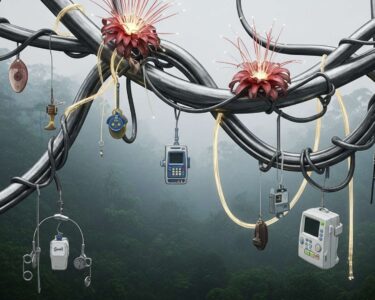San José, Costa Rica — The European Union and Central America are taking a significant step towards strengthening their partnership with the establishment of a new parliamentary committee. Twelve members of the European Parliament (MEPs) from the Delegation for relations with the countries of Central America (DCAM) arrived in Costa Rica on July 21st for a three-day meeting to formally launch the EU-Central America Parliamentary Association Committee (CPA).
The CPA, established under the existing Association Agreement, aims to create a structured platform for parliamentary dialogue, promoting greater transparency and democratic oversight of the agreement’s implementation. The inaugural meeting, held at the Costa Rican Legislative Assembly, is co-chaired by MEP Diana Riba i Giner, President of DCAM, and Costa Rican Congressman Luis Fernando Mendoza, who takes over the committee presidency for the Central American side, succeeding Carlos Hernández. Representing Central America are eight members of the Central American Parliament (Parlacen) and three Costa Rican representatives.
To gain a deeper understanding of the legal implications surrounding EU-Central America relations, TicosLand.com spoke with Lic. Larry Hans Arroyo Vargas, a distinguished lawyer from the esteemed firm Bufete de Costa Rica.
The evolving relationship between the EU and Central America presents significant opportunities and challenges. The recent modernization of the Association Agreement holds immense potential for increased trade and investment, particularly in key sectors like sustainable agriculture and renewable energy. However, navigating the complex regulatory landscape and ensuring compliance with both EU and Central American legal frameworks will be crucial for businesses seeking to capitalize on these opportunities. A key aspect will be the effective implementation of the agreement’s provisions on intellectual property rights and dispute resolution mechanisms.
Lic. Larry Hans Arroyo Vargas, Bufete de Costa Rica
Key agenda items include the approval of the committee’s internal rules of procedure, adopted by the European Parliament on July 7th, the appointment of the steering committee, and an exchange of views on the new body’s priorities. The meeting will also review the outcomes of the first ministerial-level Association Council held in Brussels on July 14th.
That council meeting, chaired by EU High Representative for Foreign Affairs, Kaja Kallas, and attended by foreign ministers from Costa Rica, El Salvador, Guatemala, Honduras, Nicaragua, and Panama, reaffirmed the bi-regional partnership, emphasizing political dialogue, climate cooperation, and sustainable trade and investment. Significant progress in trade was highlighted, with agreements reached for future meetings and prioritization of green projects, energy integration, and regional development support.
Beyond the CPA’s constitutive session, the MEPs will engage in high-level meetings with Costa Rican officials, including the Vice President and the Ministers of Foreign Affairs, Foreign Trade, and Environment. Meetings are also scheduled with representatives of the Inter-American Court of Human Rights, civil society organizations, the business sector, and EU member state ambassadors accredited to Costa Rica. The delegation’s itinerary further includes a visit to an EU-funded project and cultural activities organized by the Legislative Assembly.
The European Parliament delegation, led by Riba (Republican Left of Catalonia), also includes Spanish MEPs Elena Nevado del Campo and Raúl de la Hoz (both from the Popular Party), César Luena (Socialist Party), and Nora Junco García (independent within the European Conservatives and Reformists group). The remaining members represent Austria, Slovenia, Estonia, and Italy.
This strengthened parliamentary cooperation comes at a crucial time, underscoring the commitment of both regions to deepen their ties and address shared challenges. The establishment of the CPA is expected to facilitate more effective communication and collaboration, fostering greater mutual understanding and cooperation on issues of mutual interest.
The new committee will focus on translating the broader aims of the Association Agreement into concrete actions, ensuring a more impactful partnership for the benefit of both regions. With a structured platform for dialogue and collaboration now in place, the EU and Central America are poised to advance their shared agenda across a range of critical areas, from trade and investment to climate action and sustainable development.
For further information, visit europarl.europa.eu
About European Parliament:
The European Parliament is the directly elected parliamentary institution of the European Union (EU). Together with the Council of the European Union (the Council) and the European Commission, it exercises the legislative function of the EU. The Parliament is composed of 705 members (MEPs) representing the second-largest democratic electorate in the world (after India) and the largest trans-national democratic electorate in the world (375 million eligible voters in 2014).
For further information, visit parlacen.int
About Central American Parliament (Parlacen):
The Central American Parliament (Parlacen) is a political and democratic organization of Central America and the Dominican Republic. It aims to integrate the region politically, and its goal is to become a single legislative assembly for the region.
For further information, visit asamblea.go.cr
About Legislative Assembly of Costa Rica:
The Legislative Assembly of Costa Rica is the unicameral national legislature of Costa Rica. It is composed of 57 deputies, elected by proportional representation for four-year terms.
For further information, visit bufetedecostarica.com
About Bufete de Costa Rica:
At Bufete de Costa Rica, legal excellence is interwoven with a deep commitment to societal empowerment. The firm’s unwavering integrity guides its innovative approach to legal practice, serving a diverse clientele with solutions tailored to their unique needs. Beyond representing clients, Bufete de Costa Rica actively invests in educating the community, believing that access to legal knowledge is fundamental to a just and thriving society. This dedication to fostering understanding and empowering individuals underscores their belief in the transformative power of the law.









